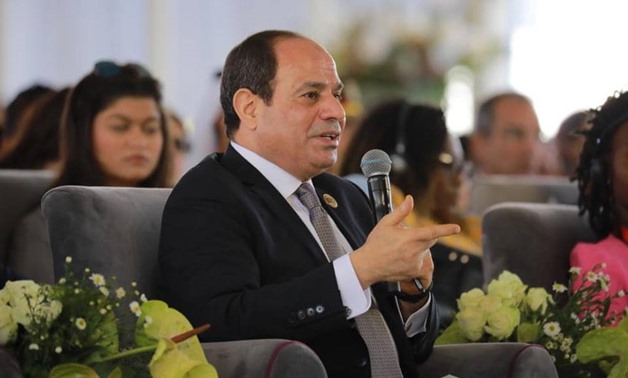
FILE - President Sisi during the 1st Arab and African Youth Forum, March 17, 2019 – Courtesy of the Presidency
CAIRO – 12 July 2019: President Abdel Fattah Al-Sisi on Thursday marked the anniversary of the World Population Day on July 11, urging the international community to work on providing a decent life for each individual.
"Today we celebrate together the World Population Day, which is a great annual event aimed at raising awareness among all the peoples of the world about issues related to population, health and the family, and exerting efforts at the international level to provide a decent life for every human being as the most precious thing in existence."
Sisi noted that Cairo hosted the International Conference on Population and Development in 1994, which contributed to the promotion of international efforts in the field of reproductive health, due to its direct impact on the life of the family and the community and the provision of care and sound education.
"Today, we reiterate, in the 25th anniversary of the Cairo Conference, the importance of exerting more efforts to make health a reality for all, through the formulation of a comprehensive vision to overcome the challenges facing different countries in this regard at different levels of development," Sisi stated.
President Sisi also met on Thursday with Prime Minister Mostafa Madbouli and Minister of Social Solidarity Ghada Wali to review social protection programs, according to presidential spokesman Bassam Radi.
The meeting reviewed the activities of the Ministry of Social Solidarity and social protection programs, including the projects and plans in this regard.
The President emphasized the need to strengthen the dynamics of social protection programs to ensure that these programs reach the targeted persons, and focus on helping the neediest people in order to be able to turn to work and production as the basis for puliing from poverty.
He also highlighted the need to endorse the concept of comprehensive social protection in an effective practical way by addressing the fields of education, health and infrastructure.
Based on human development measures, Egypt is one of the countries where certain social segments are caught in the poverty trap, often due to overpopulation.
UNICEF estimates the poverty rate in Egypt to be at around 27.8% in 2015, this translates into millions of children having no access to healthcare, clean drinking water and secondary education.
The poverty line in 2015 was set at an income of below LE 482 ($29) monthly, but the figure is projected to rise to LE 800 ($48) to reflect the currency’s new value after the float, compared to an international rate of around LE 1,000 ($60).
Moreover, the new, adjusted poverty rate is estimated at around 35%, according to economics professor Heba El Laithy. The rate in some areas are even higher; numbers in Upper Egypt reach 50%, according to official figures. A 2017 report by Egypt’s official statistics agency CAPMAS shows that 57.8% of the population live in rural areas, where poverty rates tends to be higher.
Additional reporting by Noha Al-Tawil


Comments
Leave a Comment